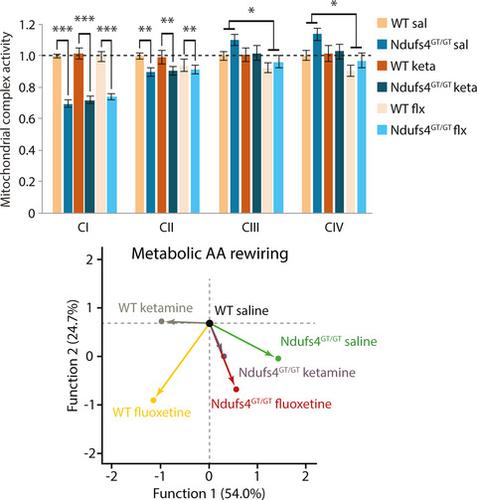当前位置:
X-MOL 学术
›
Eur. J. Nerosci.
›
论文详情
Our official English website, www.x-mol.net, welcomes your feedback! (Note: you will need to create a separate account there.)
Chronic fluoxetine or ketamine treatment differentially affects brain energy homeostasis which is not exacerbated in mice with trait suboptimal mitochondrial function
European Journal of Neroscience ( IF 3.4 ) Pub Date : 2020-07-09 , DOI: 10.1111/ejn.14901 Tim L Emmerzaal 1, 2 , Leah Jacobs 1 , Bram Geenen 1 , Vivienne Verweij 1 , Eva Morava 2, 3, 4 , Richard J Rodenburg 5 , Tamas Kozicz 1, 2
European Journal of Neroscience ( IF 3.4 ) Pub Date : 2020-07-09 , DOI: 10.1111/ejn.14901 Tim L Emmerzaal 1, 2 , Leah Jacobs 1 , Bram Geenen 1 , Vivienne Verweij 1 , Eva Morava 2, 3, 4 , Richard J Rodenburg 5 , Tamas Kozicz 1, 2
Affiliation

|
Antidepressants have been shown to influence mitochondrial function directly, and suboptimal mitochondrial function (SMF) has been implicated in complex psychiatric disorders. In the current study, we used a mouse model for trait SMF to test the hypothesis that chronic fluoxetine treatment in mice subjected to chronic stress would negatively impact brain bioenergetics, a response that would be more pronounced in mice with trait SMF. In contrast, we hypothesized that chronic ketamine treatment would positively impact mitochondrial function in both WT and mice with SMF. We used an animal model for trait SMF, the Ndufs4GT/GT mice, which exhibit 25% lower mitochondrial complex I activity. In addition to antidepressant treatment, mice were subjected to chronic unpredictable stress (CUS). This paradigm is widely used to model complex behaviours expressed in various psychiatric disorders. We assayed several physiological indices as proxies for the impact of chronic stress and antidepressant treatment. Furthermore, we measured brain mitochondrial complex activities using clinically validated assays as well as established metabolic signatures using targeted metabolomics. As hypothesized, we found evidence that chronic fluoxetine treatment negatively impacted brain bioenergetics. This phenotype was, however, not further exacerbated in mice with trait SMF. Ketamine did not have a significant influence on brain mitochondrial function in either genotype. Here we report that trait SMF could be a moderator for an individual's response to antidepressant treatment. Based on these results, we propose that in individuals with SMF and comorbid psychopathology, fluoxetine should be avoided, whereas ketamine could be a safer choice of treatment.
中文翻译:

慢性氟西汀或氯胺酮治疗对脑能量稳态的影响不同,这在特质性线粒体功能欠佳的小鼠中并未加剧
已经显示抗抑郁药会直接影响线粒体功能,而次优线粒体功能(SMF)已被认为与复杂的精神疾病有关。在当前的研究中,我们使用了特征性SMF的小鼠模型来检验以下假设:长期接受氟西汀治疗的慢性应激会对大脑生物能产生负面影响,这种反应在具有特征性SMF的小鼠中更为明显。相反,我们假设慢性氯胺酮治疗将对野生型和SMF小鼠的线粒体功能产生积极影响。我们为特质SMF使用了一个动物模型Ndufs4 GT / GT小鼠,其线粒体复合物I活性降低了25%。除抗抑郁药治疗外,小鼠还受到慢性不可预知的压力(CUS)。该范例被广泛用于对各种精神疾病中表达的复杂行为进行建模。我们分析了几种生理指标作为对慢性应激和抗抑郁药治疗的影响的代表。此外,我们使用临床验证的测定方法以及使用靶向代谢组学建立的代谢特征来测量脑线粒体复合物活性。如假设,我们发现证据表明,长期氟西汀治疗会对脑生物能产生负面影响。然而,这种表型在具有SMF性状的小鼠中并未进一步加剧。在这两种基因型中,氯胺酮对脑线粒体功能均无显着影响。在这里,我们报告说,SMF性状可能是个体对抗抑郁药治疗反应的调节剂。根据这些结果,我们建议在患有SMF和合并症的精神病理学患者中应避免使用氟西汀,而氯胺酮可能是更安全的治疗选择。
更新日期:2020-07-09
中文翻译:

慢性氟西汀或氯胺酮治疗对脑能量稳态的影响不同,这在特质性线粒体功能欠佳的小鼠中并未加剧
已经显示抗抑郁药会直接影响线粒体功能,而次优线粒体功能(SMF)已被认为与复杂的精神疾病有关。在当前的研究中,我们使用了特征性SMF的小鼠模型来检验以下假设:长期接受氟西汀治疗的慢性应激会对大脑生物能产生负面影响,这种反应在具有特征性SMF的小鼠中更为明显。相反,我们假设慢性氯胺酮治疗将对野生型和SMF小鼠的线粒体功能产生积极影响。我们为特质SMF使用了一个动物模型Ndufs4 GT / GT小鼠,其线粒体复合物I活性降低了25%。除抗抑郁药治疗外,小鼠还受到慢性不可预知的压力(CUS)。该范例被广泛用于对各种精神疾病中表达的复杂行为进行建模。我们分析了几种生理指标作为对慢性应激和抗抑郁药治疗的影响的代表。此外,我们使用临床验证的测定方法以及使用靶向代谢组学建立的代谢特征来测量脑线粒体复合物活性。如假设,我们发现证据表明,长期氟西汀治疗会对脑生物能产生负面影响。然而,这种表型在具有SMF性状的小鼠中并未进一步加剧。在这两种基因型中,氯胺酮对脑线粒体功能均无显着影响。在这里,我们报告说,SMF性状可能是个体对抗抑郁药治疗反应的调节剂。根据这些结果,我们建议在患有SMF和合并症的精神病理学患者中应避免使用氟西汀,而氯胺酮可能是更安全的治疗选择。



























 京公网安备 11010802027423号
京公网安备 11010802027423号